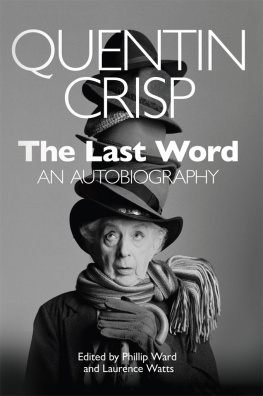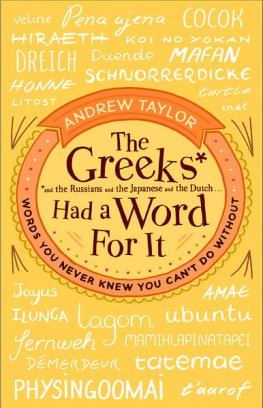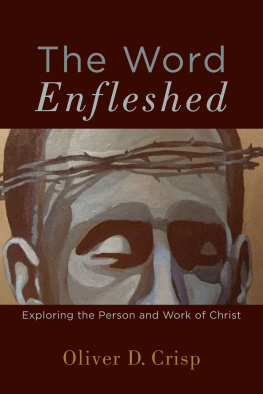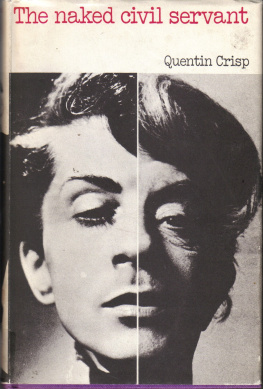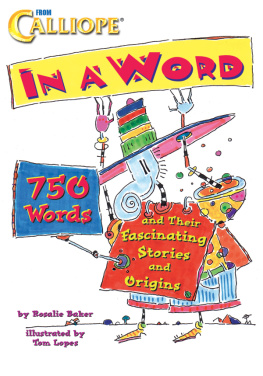Quentin Crisp - The Last Word: An Autobiography
Here you can read online Quentin Crisp - The Last Word: An Autobiography full text of the book (entire story) in english for free. Download pdf and epub, get meaning, cover and reviews about this ebook. year: 2017, publisher: MB BOOKS, LLC, genre: Art. Description of the work, (preface) as well as reviews are available. Best literature library LitArk.com created for fans of good reading and offers a wide selection of genres:
Romance novel
Science fiction
Adventure
Detective
Science
History
Home and family
Prose
Art
Politics
Computer
Non-fiction
Religion
Business
Children
Humor
Choose a favorite category and find really read worthwhile books. Enjoy immersion in the world of imagination, feel the emotions of the characters or learn something new for yourself, make an fascinating discovery.
- Book:The Last Word: An Autobiography
- Author:
- Publisher:MB BOOKS, LLC
- Genre:
- Year:2017
- Rating:4 / 5
- Favourites:Add to favourites
- Your mark:
- 80
- 1
- 2
- 3
- 4
- 5
The Last Word: An Autobiography: summary, description and annotation
We offer to read an annotation, description, summary or preface (depends on what the author of the book "The Last Word: An Autobiography" wrote himself). If you haven't found the necessary information about the book — write in the comments, we will try to find it.
The Last Word: An Autobiography — read online for free the complete book (whole text) full work
Below is the text of the book, divided by pages. System saving the place of the last page read, allows you to conveniently read the book "The Last Word: An Autobiography" online for free, without having to search again every time where you left off. Put a bookmark, and you can go to the page where you finished reading at any time.
Font size:
Interval:
Bookmark:
The Last Word
The Last Word
AN AUTOBIOGRAPHY
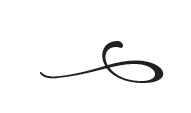
Quentin Crisp

Edited by Phillip Ward
and
Laurence Watts
2017 Phillip Ward
All rights reserved.
Front cover photograph by Joseph Mulligan
ISBN-13: 9780692968482
ISBN-10: 0692968482
Foreword

T he Last Word is the third installment of Quentin Crisps autobiography. Lets start there. What kind of a man gets to write three autobiographies? Most of us will never get to write one. Moreover, what kind of man achieves fame, or infamy as Quentin would say, in his sixties?
The answer is a man who was universally shunned and who became famous for revealing his society-enforced exile to the world. It took Quentin the vast majority of his life to generate the kind of life experience that would eventually fill the pages of The Naked Civil Servant. Was it time well spent? Hardly. But Quentin was, in more ways than one, very much a victim of the time in which he lived.
Homosexuality was illegal in the United Kingdom until 1967, by which time Quentin was 58 years old, ten years after the Wolfendon report had recommended that homosexual behavior between consenting adults in private should no longer be a criminal offence. Quentins seminal radio interview with Phillip OConnor may have been broadcast in 1964, but the first installment of his autobiography, The Naked Civil Servant, was not published until 1968. Public interest in the books subject matter would surely have been key to Jonathan Capes decision to commission the work.
A year later the Stonewall riots took place in New York, followed over the next several years by the state by state repeal of the majority of Americas sodomy laws. The Naked Civil Servant rode this wave of liberalism, becoming a television documentary in 1971 and a film in 1975 starring John Hurt as Quentin, a performance for which he won the 1976 British Academy of Film and Television Arts (BAFTA) Award for Best Actor.
The Naked Civil Servant elevated Quentin Crisp to the status of gay icon, detailing as it did Quentins pioneering existence and persecution as an openly gay man in the 1930s, 40s, 50s and 60s. It was very much a first of its kind. Was Quentin the kind of gay icon that the emerging global gay community wanted or needed? Perhaps not, but who else was there? Initially at least, options were few. Gay men may not have looked at Quentin and seen themselves, but they related to his isolation and oppression.
What Quentin did next however was perpetuate his celebrity through an eccentricity and constant accessibility that kept him on the fringes of the art and entertainment worlds for the next twenty-four years. To be fair, he never achieved Hollywood-level fame, but the suffering of his early life gave him a credibility that endeared him to the gay community and a number of influential people.
One of Crisps fans was Sting who wrote his 1987 hit Englishman in New York about him. Another was Calvin Klein who cast Quentin in a commercial for one of his colognes. The list goes on and meant that the pain of Quentins early years was at least partially compensated for in the twilight of his life. Shear longevity on Crisps part meant that he was able to enjoy this cult status for years more than a typical actor or writer. In fact, by the time he died in 1999 Quentin had published 14 books and starred in more than 20 films despite no specific training in either craft.
The Last Word reads differently from Quentins earlier books, especially The Naked Civil Servant. This owes less to how it has been edited and more to when and how it was written. Quentin lost the use of his left hand in the early 1990s when he was in his eighties and became unable to use his typewriter. Subsequent works of his were dictated; The Last Word was recorded by his best friend Phillip Ward. As such, The Last Word reads more like a monologue and less like a written text. We have tried to alter the content and style of The Last Word as little as possible in the hope that the end result provides a more reliable and intimate portrait of Quentin in the last year of his life. Yes, he grandstands and repeats and contradicts himself, but what ninety-year-old that you know doesnt? The important thing is that he is speaking directly to you because as you read this you are the most important person in the world to him.
This final installment of his autobiography was finished in 1999, the year of Quentins death. As youll see from reading this book, Quentin had begun to put his affairs in order knowing that, aged ninety and with an enlarged heart and prostate cancer, his long life was finally nearing its end. He didnt know exactly how much longer he had, but The Last Word was written to share his untold stories and to reflect for the last time on an extraordinary life.
Why has it taken so long to be published? Well, perhaps thats what happens when you leave your best friend in charge of your literary estate. As I mentioned, Quentin dictated this book to Phillip. When one listens to the recordings as I have, Quentin does not sound in good health. Frequently he can be heard coughing or furiously scratching at his cracked and brittle skin. After Quentins death it was too painful for Phillip to hear Quentins voice, let alone take in and transcribe what he had said. Time is the only remedy for such pain and that alone explains the delay in getting this book to you.
I first met Phillip when I interviewed him for Pink News in 2011. Once our interview had been published he enlisted me to help him with The Last Word and our combined efforts have produced the text you are about to read. One of my regrets is that we were unable to finish it before John Hurts death earlier this year. Another issue is that, with so much time having passed since Quentins death, there is the very real question of just how many people now remember who Quentin was. It is with this in mind, not to mention the generational collapse in reading that we are currently witnessing, that I have sought to provide as much detail on Quentins life, observations and quotes in the form of footnotes. I have assumed little to no knowledge of Quentins reference points on the part of the reader.
Quentin, as I have said, was a victim of his time in more ways than one. This is particularly true when it comes to his transgenderism which he talks about at length in The Last Word. That Quentin lived his life believing himself to be gay is because our understanding of what it means to be transgender is relatively new. The term itself only acquired its current meaning in the 1990s, the last decade of Quentins life. He mistook being transgender for being homosexual in the same way that Chaz Bono, the erstwhile daughter of Cher, first believed he was lesbian. The gay men who couldnt associate with Quentins femininity or his pronouncements about gay life were right to be confused. He inaccurately believed his own feelings were the same as theirs. It turns out they werent.
Crisps other altercations with the gay community arguably came about because of his assumed later-in-life role of quotable contrarian, which kept his name in the news and no doubt kept the dinner invitations rolling in. Quentin had two strings to his public commentary bow. When it came to talking about himself he told you what you wanted to hear: that he was unloved, that England was horrible, that everyone and everything in America was wonderful, and that he had never worked a day in his life. When it came to talking about other people, topics or events, he erred towards sensationalism. This made sure that his was the quote the journalists printed. Even if it wasnt actually his opinion. Thus, Princess Diana was a disgrace who got what she deserved and AIDS was a fad. These so-called opinions of Quentins became problems for him that were further complicated by his refusal to publicly recant anything he had previously said. Doing so, he thought, would cost him credibility.
Next pageFont size:
Interval:
Bookmark:
Similar books «The Last Word: An Autobiography»
Look at similar books to The Last Word: An Autobiography. We have selected literature similar in name and meaning in the hope of providing readers with more options to find new, interesting, not yet read works.
Discussion, reviews of the book The Last Word: An Autobiography and just readers' own opinions. Leave your comments, write what you think about the work, its meaning or the main characters. Specify what exactly you liked and what you didn't like, and why you think so.

